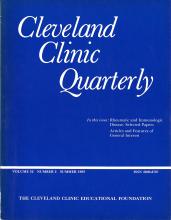ABSTRACT
Four cases of lymphomatoid granulomatosis (LYG) were studied by light microscopy, electron microscopy, and paraffin-section immunohistochemistry for immunoglobulin light chains and muramidase. In two of the four cases, frozen-section immunohistochemistry was performed to demonstrate immunoglobulin light chains, heavy chains, and complement. These two cases were also studied by frozen-section immunohistochemistry using monoclonal antibodies to evaluate the expression of lymphocyte differentiation antigens by the proliferating cells. The pulmonary lesions demonstrated polyclonal light chain immunostaining. However, only a few cells were positive for surface or cytoplasmic immunoglobulin. Cytologically atypical large lymphoid cells invariably contained cytoplasmic immunoglobulin of one light chain type and did not express T lymphocyte differentiation antigens. Most of the infíltrate was composed of T lymphocytes (as demonstrated using monoclonal hybridoma antibodies) and muramidase positive tissue macrophages. No extracellular immune complexes were demonstrated. Based upon these observations, the authors postulate that the early lesions of LYG represent a form of cell-mediated vasculitis which can and usually does progress to a malignant lymphoproliferative disorder which in some cases demonstrate T cell differentiation.
- Received November 1984.
- Accepted May 1985.
- Copyright © 1985 The Cleveland Clinic Foundation. All Rights Reserved.






